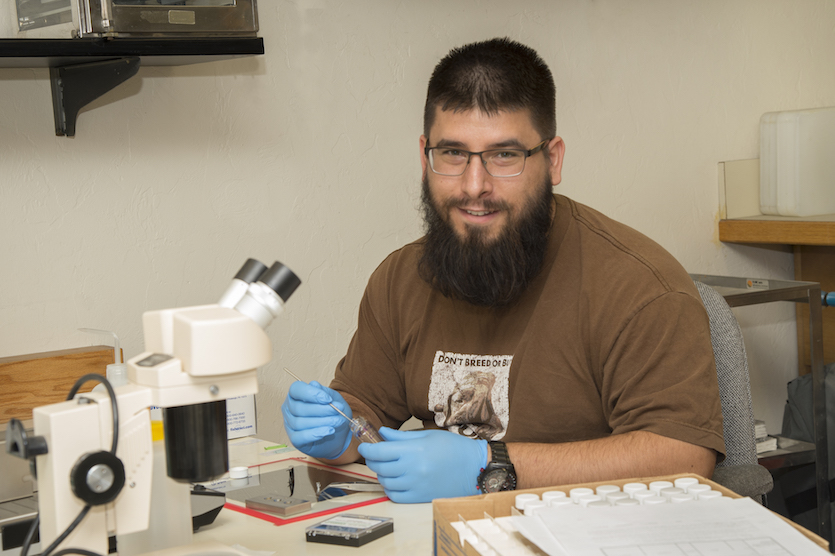ISU undergrad Jeremy Starkey, a MILES and MURI researcher, is working with beetles to improve ecosystems
July 26, 2017

POCATELLO – Jeremy Starkey, an undergraduate researcher in the Idaho State University Department of Biology Sciences, has been researching how the Carrion Beetle has a connection to the development of more nutrient-rich soil.
Starkey is among the students at ISU who has received an opportunity to do undergraduate research with a real-world purpose this summer. He was selected for a National Science Foundation (NSF) Managing Idaho’s Landscape for Ecosystem Services (MILES) Undergraduate Research and Internship (MURI) program grant.
Starkey has been working under the direction of Rosemary Smith, professor for the Department of Biological Sciences. Their research, that has taken place over the last year, has made great progress related to questions about how this beetle impacts the surrounding areas of Pocatello and in different areas of the world.
These beetles use carcasses of animals and bring them underground and eat the animal. After it is digested, the beetles are able to create a more nutrient rich soil by releasing nitrogen and carbon into the ground. This allows for the surrounding area to produce more vegetation and help with local agriculture.
Smith has allowed Starkey to take a primary role in doing this research and the two are working on their first research article together that is nearly completed. While working in the lab, Starkey records, breeds, processes samples of the soil and helps to teach other students about the process so that they can work within this research field as well.
“Because of the MILES and MURI Research grant I am now able to focus on this research and work towards publishing the research,” Starkey said. “It has also helped me gain more research experience than I previously had. I am able to learn the best way to avoid simple research errors and become a better researcher.”
At ISU, Starkey has been able to reach more professors, and learn from their research as well. From their research, he is able to see ways that he can improve his own area of research and learn about new subjects within biology. He pointed out that because of the visibility of being in the MILES and MURI program he has had more access to professors in the department. With more access to professors, he is able to decide if he is interested in pursuing anything within their field of study. He said this is a wonderful tool in order to network more with other researchers and become a more well-rounded researcher.
“I have found that with every new professor I come in contact with they have more insight into how to go on to higher levels of education,” Starkey said. “The professors in this department make biology more fun and exciting to me and other students. I truly believe that the biology department here at ISU is just as good, if not better, than any of the other programs here at ISU. We have so many amazing professors and scientists here at ISU.”
The NSF Idaho Experimental Program to Stimulate Competitive Research (EPSCoR) program awarded Idaho with a $20 million MILES grant to improve research related to social ecological systems science. ISU, the University of Idaho, Boise State University and other Idaho institutions are working together within the framework of this grant.
MILES research is completed by scientists, students and support staff. At ISU, the team includes about 15 professors, three post-doctoral research associates, five to 10 graduate students, 20 undergraduates and five support staff. ISU researchers come from the fields of ecology, geology, history, sociology, political science and computer science.
If you would like to find out more about the program visit the ISU MILES website at miles.isu.edu. You can also learn more about the MURI project with Idaho ecosystems at idahoecosystems.org/education/muri. For more information on the ISU Department of Biological Sciences, visit www.isu.edu/bios/.

